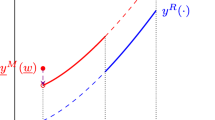Abstract
We first show that, in general, a majority-voting game with vote-selling will not have any equilibria. We then evaluate the desirability of vote-selling, using a rudimentary ‘theory of blocking trajectories.’
Similar content being viewed by others
References
Bergstrom, T.C. (1979). When does majority rule supply public goods efficiently? Scandinavian Journal of Economics 81: 216–226.
Bernholz, P. (1973). Logrolling, Arrow Paradox and cyclical majorities. Public Choice 15: 87–95.
Bernholz, P. (1975). Grundlagen der politischen Ökonomie 2: 10–25. Tübingen: J.C.B. Mohr.
Bowen, H. (1943). The interpretation of voting in the allocation of resources. Quarterly Journal of Economics 58: 27–48.
Buchanan, J.M., and Tullock, G. (1962). The calculus of consent. Ann Arbor: University of Michigan Press.
Cohen, L. (1979). Cyclic sets in multidimensional voting models. Journal of Economic Theory 20: 1–12.
Feldman, A.M. (1974). Recontracting stability. Econometrica 42: 35–44.
Green, J. (1974). The stability of Edgeworth's recontracting process. Econometrica 42: 21–34.
Kramer, G.H. (1973). On a class of equilibrium conditions for majority rule. Econometrica 41: 285–297.
Kramer, G.H., and Klevorick, A.K. (1974). Existence of a ‘local’ cooperative equilibrium in a class of voting games. Review of Economic Studies 41 (4): 539–548.
McCloskey, D. (1982). The applied theory of price. New York: Maxmillan.
McKelvey, R.D. (1979). General conditions for global intransitivities in formal voting models. Econometrica 47: 1085–1111.
Okun, A.M. (1975). Equality and efficiency: The big trade-off. Washington DC: Brookings Institution.
Schofield, N. (1983). Generic instability of majority rule. Review of Economic Studies 50 (4): 695–705.
Slutsky, S. (1977). A voting model for the allocation of public goods: Existence of an equilibrium. Journal of Economic Theory 14: 299–325.
Stiglitz, J.E. (1974). The demand for education in public and private school systems. Journal of Public Economics 3: 349–385.
Tobin, J. (1970). On limiting the domain of inequality. Journal of Law and Economics 13: 263–277.
Weiss, J.H. (1979). The impact of vote-selling on a majority-voting game. Baruch College Working Paper.
Weiss, J.H. (1986). Can donations reduce a donor's welfare? Public Choice 37: 337–347.
Author information
Authors and Affiliations
Additional information
I am grateful to Donald Gordon, Norman Kleinberg, Roger Mesznik, Peter Aranson and a referee for their many helpful comments. The results of Section 3 originally appeared in my 1979 working paper, while Section 4 owes much to the probing questions of an unknown referee.
Rights and permissions
About this article
Cite this article
Weiss, J.H. Is vote-selling desirable?. Public Choice 59, 177–194 (1988). https://doi.org/10.1007/BF00054453
Issue Date:
DOI: https://doi.org/10.1007/BF00054453




